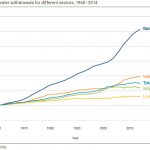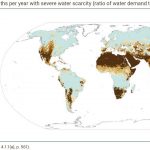ED’s corner: Happy (belated) World Water Day 2024!

As I settle down to read the latest UN Water Report, Water for prosperity and peace, it occurs to me that water issues in western Canada are receiving a level of attention they deserve but seldom receive. A great deal of water shortage (aka drought) planning is underway in Alberta and BC. Meanwhile in Ontario, the snow pack is also below average. So, unless something changes sharply we are probably in for another year of water supply worries.
We Tweeted (X’ed?) a selection of stories from around the world related to World Water Day on March 24th as part of our weekday news clipping service. We focused on stories and links to what we thought you’d find interesting and informative. On a personal level, I’m intrigued by the announcement of the Google freshwater hub. Based on a quick look, there is a lot of educational material on the hub. If you’re in the world of teaching school children about water and are looking to include some global content, I suggest you take a look.
So, on to the UN report…
 Increase in water withdrawals 1960-2014. Source: UN World Water Development Report 2024. |
The UN’s “World Water Development Report 2024” is the latest of a series of reports published on World Water Day. This year’s report, “Water for peace and prosperity” follows 2023’s “Partnerships and cooperation for water” and continues highlighting positive aspects of our water stresses. By the way, the 2022 report, “Groundwater: making the invisible visible” is well worth a read if you have any interest in the looming groundwater challenges.
This year’s report, as should be expected from the title, is focused on highlighting how water security through sustainable water management leads to prosperity which, if equitably shared, can lead to peace. I suspect we have all heard the saying to the effect of “the next wars will be over water”. The report’s authors tackle that saying head on by consciously highlighting where water cooperation, especially in the transboundary arena has helped promote interjurisdictional dialogue and cooperation. In closing, the report goes on to state that water is not “yet … a trigger of conflict” (p.149) while noting and deploring reports of attacks on water infrastructure (e.g. Kakhovka Dam) as against international law. Personally, I don’t find the “yet” reassuring… The report is broken into chapters on given topics (listed below). The chapters are not long and are targeted at a general audience so not particularly technical. It makes it easy to dive in and quickly read a topic of particular interest. |
2024’s Chapter Headings
| Prologue
1: Introduction 2: Agriculture and rural development 3: Human settlements: WASH, disaster risk reduction and migration 4: Industry 5: Energy 6: Environment |
7: Transboundary cooperation
8: Regional perspectives 9: Governance 10: Science, technology and information 11: Education and capacity development 12: Financing water security and mitigating investment risks 13: Conclusions |
Some factoids/excerpts from the report:
|
 Months/Year of demand > supply. Source: UN World Water Development Report 2024. |
Given we are the WaterPortal and are focussed on water education, I am particularly pleased to be able to offer up the following closing quote:
“Education remains the foundation to change human behaviour and build consensus for sustainable approaches to water services provision and resources management (UNESCO-IHP, 2022). Water education is therefore key … “ (p.134)
And so, in closing off this brief overview, I’d like to thank you for your interest in water and your support of the WaterPortal. May we all have a year in which we receive just the right amount of water!
Source:
United Nations, 2024, The United Nations World Water Development Report 2024: Water for Prosperity and Peace. UNESCO, Paris. https://www.unwater.org/publications/un-world-water-development-report-2024. Accessed 2024-03-26.
